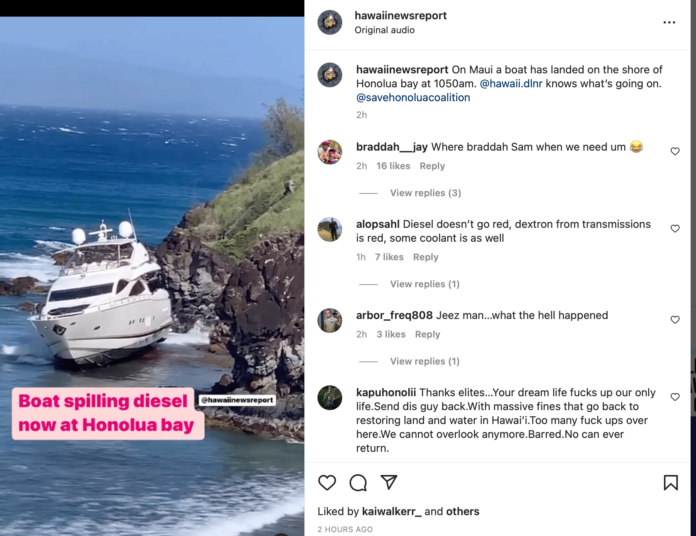
“Thanks elites. Your dream life fucks up our only life. Send dis guy back. With massive fines that go back to restoring land and water in Hawai’i.”
A wild-looking 94-foot super yacht ran aground in Honolua Bay on Maui Monday morning after its mooring line snapped, sparking outrage on social media over the boat’s potential damage to the iconic wave and the surrounding marine environment.
Videos posted to social media showed the vessel, named the Nakoa, stuck on the rocks in front of where surfers paddle out to the world-famous righthand point. It came to rest about 700 feet out- side of the state Honolua-Mokuleia Bay Marine Life Conservation District at the part of the reef surfers call the Point.
“Such a bummer,” big-wave surfer Kai Lenny commented on one Instagram post.
“They need to be held responsible for every inch of reef,” wrote another user. “I hope they receive millions in fines by the looks of the yacht that they have.”
From another,
“Thanks elites…Your dream life fucks up our only life. Send dis guy back. With massive fines that go back to restoring land and water in Hawai’i. Too many fuck ups over here. We cannot overlook anymore.Barred. No can ever return.”
The vessel is one of two luxury yachts owned by Noelani Yacht Charters. With a top speed of 32 knots, the Nakoa has four bedrooms, five bathrooms and a full kitchen. Charter packages start at $9,801, according to the company’s website.
“While she’s well suited for day trips around any of Hawaii’s major islands, she’s more perfectly suited for unforgettable multi- day luxury experiences for guests who demand only the best,” the website states.
Reached by phone, Jim Jones, owner of Noelani Yacht Charters, said, “The boat’s in great shape,” although some “stabilizer fins” broke off.
Asked whether fuel was leaking from it as some Instagram users noted, he said, “There’s no leak at all.”
Jones was on a family outing when the mooring line snapped around 5:30 a.m., and the boat drifted onto the reef around 6 a.m., he said.
“The wind came up strong this morning,” said Jones. He had hoped the rising tide would lift it off the reef by 4 p.m. Monday, he said.
By 4:25 p.m. the boat could not be removed, according to Department of Land and Natural Resources spokesperson Dan Dennison.
The Coast Guard was still on the scene Monday afternoon. There was no leak of fuel or hazardous materials, he said.
Community members expressed their concern over the boat’s damage to the marine environment.
“The community is super concerned if another swell comes if the boat breaks apart in the lineup,” said Tamara Paltin, a Maui County Council member representing West Maui and volunteer president of the Save Honolua Coalition. “The Save Honolua Coalition has been trying for years to get the state to better manage the bay. The community is demanding full accountability from this company.”
“What happened at Honolua Bay is an environmental disaster,” Tiare Lawrence, a board member of the community group Ka Malu o Kahalawai, wrote in a text. “In these situations, commercial and mooring permits should automatically be rescinded.”
Day-use moorings have a limit of two hours, Dennison added.
Buoys of this kind are intended to prevent boats from damaging the reef with their anchors, according to the Malama Kai Foundation.
Jones, who owns the Nakoa, says he spent the night in the boat moored to the day-use buoy. “We were unaware that that was not allowed,” Jones said. “I get the locals are upset,” Jones said. “This is not intentional, and we apologize for being in this prime surf spot. We’re just trying to get off the rocks.”
(This story first ran in the Honolulu Star-Advertiser and is Jackie Truesdale’s first story for BeachGrit. It ain’t the style he’d usually submit for BeachGrit and he did offer carte blanche to gussy it up a little. But who needs colour when you got someone who picks up a phone, am I right?)





